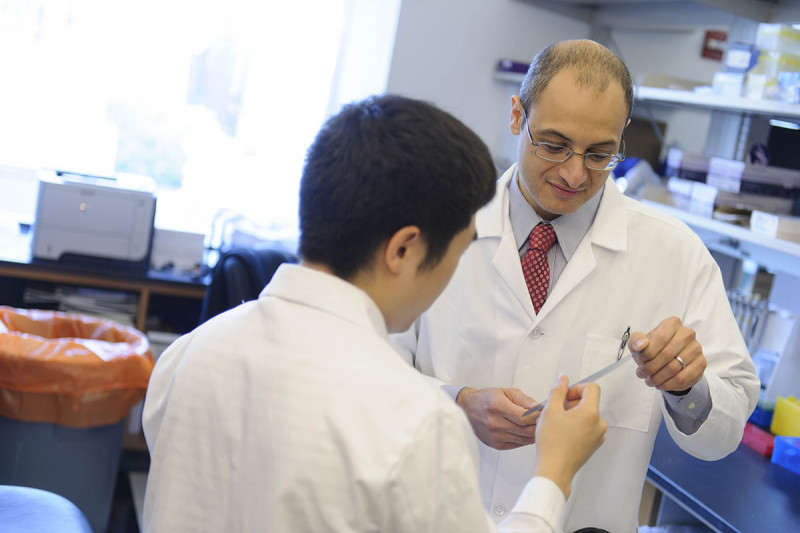
Manufacturing proteins is a multistep process that’s hard-coded into how our cells operate. Genes, which are made of DNA, get translated into RNA, which in turn provides instructions on how proteins are made. One key step in this construction process is called RNA splicing. Like the editing of a film, when some pieces may be cut out and discarded, splicing involves removing portions of the RNA and stitching the remaining pieces back together.
New work from Memorial Sloan Kettering is illustrating that when splicing isn’t done properly, it can lead to cancer.
MSK physician-scientist Omar Abdel-Wahab focuses on studying this process in his lab. He recently published two studies looking at the role of specific RNA splicing factors in different cancers. One study focused on acute myeloid leukemia (AML); the other studied melanoma, particularly uveal (eye) melanoma.
“Our earlier research found that splicing factors are mutated at high frequency in a variety of cancer types,” says Dr. Abdel-Wahab, of the Human Oncology and Pathogenesis Program. “What we’re learning is that when these splicing factor proteins are mutated, they’re actually changing the function of the splicing machinery in cells. Importantly, they’re doing it in a way that promotes cancer.”
The research reported in both papers has already suggested possible approaches for targeting these defective splicing factors with drugs.
Combination Approach for Acute Myeloid Leukemia
The first paper, published October 2 in Nature, looked at a splicing factor called SRSF2. The SRSF2 gene is mutated in about one-quarter of AML cases. It turns out that these SRSF2 mutations are more likely to be present when cancer cells also have mutations in the IDH2 gene, which is commonly mutated in AML.
“We were surprised to find that mutations in SRSF2 are particularly frequent in AML that also has IDH mutations,” Dr. Abdel-Wahab says. “We decided to investigate this link.”
Two IDH genes — IDH1 and IDH2 — are commonly mutated in AML. Together, these mutations also are found in about one-quarter of AML cases. In the past few years, the US Food and Drug Administration has approved two drugs designed to target these mutations: enasidenib (Idhifa®) for IDH1 and ivosidenib (Tibsovo®) for IDH2.
“IDH mutations have been very clearly shown to drive leukemia development,” Dr. Abdel-Wahab explains. “What we showed in this paper is that the splicing errors caused by SRSF2 mutations are also part of this process. The interplay between these two types of mutations is very important.”
Dr. Abdel-Wahab’s lab is focused on developing drugs to target mutant splicing factors, including SRSF2. He is already conducting an early-stage clinical trial with one of these drugs, and more studies are planned.
“Now we’re really interested in trying to develop ways to target forms of AML that have both mutations,” he says. “The idea is that we could use these drugs together, so that we’re targeting the cancer from two sides.”
Targeting Melanoma with a New Kind of Therapy
In the second paper, published October 9 in Nature, Dr. Abdel-Wahab and his colleagues looked at another splicing factor, called SF3B1. Mutations in the SF3B1 gene are found in many types of cancer, including some types of leukemia and many solid tumors. They are most commonly found in uveal melanoma, a rare but aggressive eye cancer.
In this study, a collaboration with researchers at the Fred Hutchinson Cancer Research Center in Seattle, the investigators studied RNA sequencing data from people with several forms of cancer.
“We wanted to see if we could find a link to what the mutation is doing in these diseases,” Dr. Abdel-Wahab says. “We found that the mutation is disrupting a critical part of the splicing machinery in a way that drove the formation of cancer.”
As part of the study, the researchers were able to develop a way to block the altered RNA splicing caused by the mutated splicing factor. Instead of using a drug, they used a small piece of DNA called an antisense oligonucleotide. Oligonucleotide therapy is a relatively new form of treatment: A handful of oligonucleotide-based drugs have been FDA approved, mostly for genetic neurologic diseases.
Dr. Abdel-Wahab and his colleagues tested the antisense oligonucleotide in cultures of cells with SF3B1 mutations and found that it blocked the growth of cancer cells. They then tested the therapy in mice that were implanted with material from patient samples of uveal melanoma. The treatment reduced the size of the tumors in the mice.
“We would like to work to develop this antisense oligonucleotide as a treatment, so that we can eventually start a clinical trial,” Dr. Abdel-Wahab says. “It’s a challenging undertaking because of the way these oligonucleotides behave in the body. But we think it’s a promising approach.”





